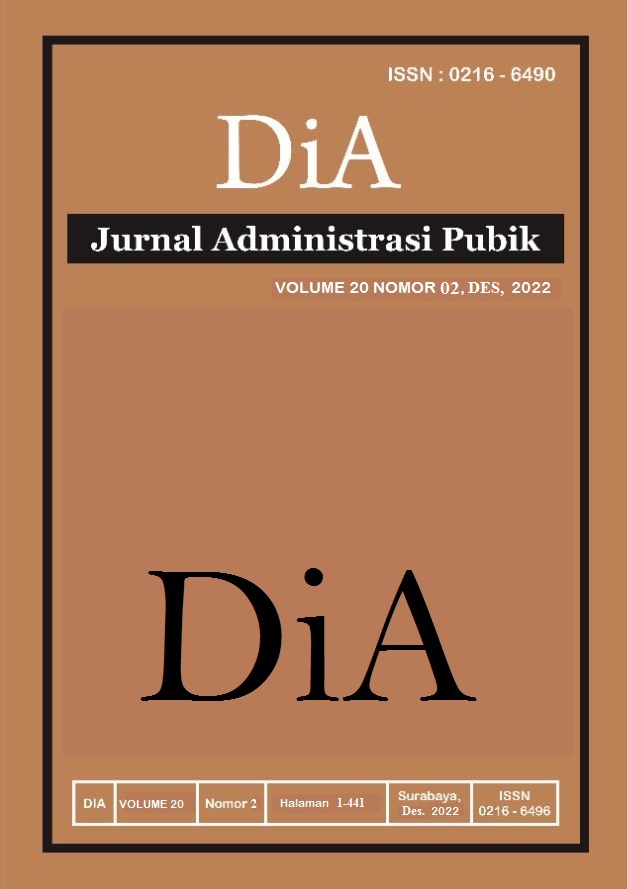ANALYSIS OF CHALLENGES AND POTENTIAL FOR VILLAGE ECONOMIC EQUITY THROUGH MSMES IN TULUNGAGUNG REGENCY
DOI:
https://doi.org/10.30996/dia.v20i02.6598Keywords:
Challenges, Potentials, Economic Equity, SDGs, MSMEsAbstract
This study aims to analyze and describe various challenges and potentials in village economic equality. Based on the facts exposed, there arethe condition of the village is still lagging behind, so it is necessary for the economic empowerment of the MSME community to be proven to contribute to the Indonesian economy. The condition of the village is still lagging behind, so it is necessary to empower the community's economy. MSMEs have an important role in national development, namely employment, income distribution, rural economic development. However, in addition to the various obstacles that arise, there is a potential that creates opportunities to achieve economic equality in the village in accordance with the 17 goals of the SDGs. The research method applied in this research is the qualitative method of content analysis regarding the equitable distribution of the village economy. Data analysis using Nvivo 12 Plus. The results of the study reveal that the potential for village economic equality includes various aspects, namely the support of the central government, SDGs program, participation, technology and information support and natural resources with the highest rating, namely the support of the central government with a figure of 67.07%. The results show that they contribute to the formulation and development of science, especially government science related to the development of village SDGs, especially regarding the challenges and potential for equitable distribution of the village economy.
Downloads
References
Akbar, R. (2020). Tiga Juta Pekerja Terdampak Covid-19. Artikel online. Diunduh dari https://www.radarcirebon.com/2020/06/14/tiga-juta-pekerja-terdampak-covid-19/, 22 Oktober 2020
Betts, M. (2013). Future Time Perspective: Examinations of multiple conceptualizations and work-related correlates. Thesis, 1-90.
Brown GC, Brown MM, Sharma S, Brown H, Smithen L, Leeser DB, Beauchamp G (2004). Value-based medicine and ophthalmology: an appraisal of cost-utility analyses. Trans Am Ophthalmol Soc.; 102: 177–188.
Blustein, D. L., & Phillips, S. D. (1988). Individual and Contextual Factors in Career Exploration. Journal of Vocational Behavior, 33, 213-216.
Carstensen, Isacowitz, & Charles. (1999). Taking Time Seroiusly: A Theory of Socioemotional Selectivity. American Psychological Association, 54(3), 165-181.
Fatmawati. (2016). Pengaruh Dukungan Sosial Terhadap Kecemasan Karir Siswa Kelas XI Akuntansi di SMK NEGERI 1 Bantul. Program Studi Bimbingan dan Konseling Jurusan Psikologi Pendidikan dan Bimbingan Fakultas Ilmu Pendidikan Univeristas Negeri Yogyakarta.
Ferrari, L., Nota, L., & Soresi, S. (2010). Time Perspective and Indecision in Young and Older Adolescents. British Journal of Guidance & Counseling, 38, 61-82.
Haber, A.,dan Runyon, R. P. (1984). Psychology of Adjustment. Illinois: The Dorsey Press. Hadi, A. (2020). Mengatasi Kecemasan Hilang Pekerjaan karena COVID-19. Artikel online. Diunduh dari https://tirto.id/mengatasi-kecemasan-hilang-pekerjaan-karena-covid-19-fBfg, 22 Oktober 2020
Hurlock, Elizabeth. (2004). Developmenral Psychology. Jakarta: Erlangga.
Hurlock, Elizabeth. (2011). Psikologi Perkembangan : Suatu Pendekatan Sepanjang Rentang Kehidupan. Jakarta: Erlangga.
Husman, J., & Shell, D. F. (2008). Beliefs and Perceptions about the Future: A Measurement of Future Time Perspective. Learning and Individual Differences, 18(2), 166–175.
Proceeding
International Seminar of Multicultural Psychology (ISMP 1st)
Faculty of Psychology Universitas 17 Agustus 1945 Surabaya
Karunia, A.M. (2020). Kemenaker : Dampak Corona Dahsyat, 13,9 Persen Perusahaan Kurangi Karyawan. Artikel online. Diunduh dari https://money.kompas.com/ read/2020/07/01/214000326/kemenaker--dampak-corona-dahsyat-13-9-persen-perusahaan-kurangi-karyawan, 22 Oktober 2020
Kemnaker (2020). Dampak terhadap Dunia Ketenagakerjaan Sangat Besar Terutama Banyak Perusahaan yang Memilih Melakukan Pemutusan Hubungan Kerja (PHK) Karyawan. Artikel Online. Diunduh dari https://www.google.co.id/amp/s/amp.kompas.com/money/read/2020/07/01/214000326/keme-naker--dampak-corona-dahsyat-13-9-persen-perusahaan-kurangi-karyawan), 15 Oktober 2020
Kooij, D. T. A. M., Kanfer, R., Betts, M., & Rudolph, C. W. (2018). Future Time Perspective: A Systematic Review and Meta-Analysis. Journal of Applied Psychology, 103(8), 867–893.
Lang, F. R., & Carstensen, L. L. (2002). Time Counts: Future Time Perspective, Goals, and Social Relationships. Psychology and Aging, 17(1), 125–139. Mahardhika, A. (2020). 7 Penyebab Gangguan Kecemasan Mahasiswa di Tengah Pandemi Corona. Artikel online. Diunduh dari https://health.detik.com/berita-detikhealth/d-4980442/7-penyebab-gangguan-kecemasan-mahasiswa-di-tengah-pandemi-corona, 22 Oktober 2020
Papalia, dkk. (2008). Human Development (Psikologi Perkembangan). Jakarta: Kencana Prenada Media Group.
Priest, R. (1994). Bagaimana Cara Mencegah Dan Mengatasi Stres Dan Depresi. Semarang: Dahara Prize.
Rosliani, N., & Ariati, J. (2016). Hubungan antara Regulasi Diri dengan Kecemasan Menghadapi Dunia Kerja pada Pengurus Ikatan Lembaga Mahasiswa Psikologi Indonesia (ILMPI). Jurnal Empati, 5(4), 744-749. Roscoe, J.T. (1975). Fundamental Research Statistic for The Behavior Sciences, (2nd, ed). Holk, Rineheart and Winston: New York.
Setiyawati. (2020). Dampak Munculnya Kecemasan pada Mahasiswa. Diunduh dari https://health.detik.com/berita-detikhealth/d-4980442/7-penyebab-gangguan-kecemasan-mahasiswa-di-tengah-pandemi-corona, 15 Oktober 2020
Setyowati. (2012). Hubungan Antara Konsep Diri Dan Kematangan Karir Siswa Kelas X SMK 1 Kristen Salatiga. Diakses Pada Tanggal 10 November 2020 di http://repository. library.uksw.edu/bitstream/handle/123456789/1792/T1_132007058_BAB%20II.pdf?sequ ence=3
Sudarmanto, R. G. (2005). Analisis Regresi Linier Berganda dengan SPSS. Yogyakarta: Penerbit Graha Ilmu.
Sugiyono. (2016). Metode Penelitian Kuantitatif, Kualitatif dan R&D. Bandung: Penerbit Alfabeta.
Sugiyono. (2010). Metode Penelitian Pendidikan. Bandung: Alfabeta.
Siswanti, A. (2019). Pengaruh Future Time Perspective terhadap Work Readiness pada Mahasiswa Tingkat Akhir di Univeristas Islam Negeri Maulana Malik Ibrahim Malang. Fakultas Psikologi Universitas Islam Negeri Maulana Malik Ibrahim, Malang.
Strathman, A., Gleicher, F.,Boninger, D., Edwards, C. (1994). The Consideration of Future Consequences: Weighing Immediate and Distant Outcomes of Behavior. Journal of Personality and Social Psychology, 66(4), 742-752.
Walker, T.L., & Tracey, T.J. (2012). The Role of Future Time Perspective in Career Decision Making. Journal Vacational Behavior and Personality, 43, 649-660.
Downloads
Published
How to Cite
Issue
Section
License
The DiA journal allows authors to retain the copyright of their papers without limitation. Authors may grant publishers non-exclusive publishing rights to publish articles. Granting first publishing rights to publishers also qualifies as unlimited copyright (because there are no restrictions imposed by publishers on author copyright).







